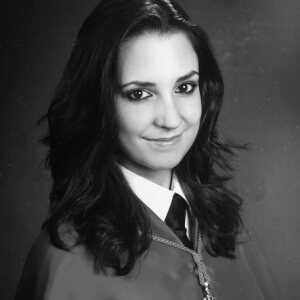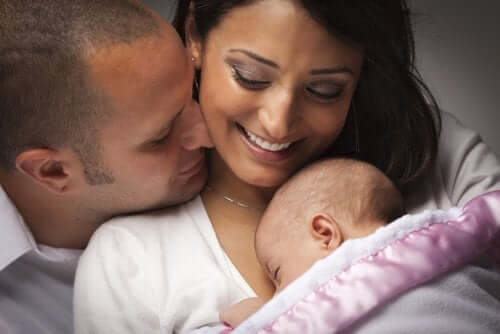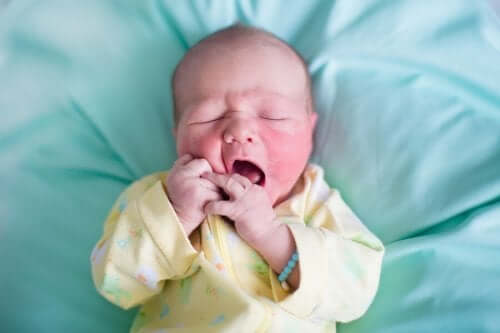Neonatal Care in the First Hours of Life


Written and verified by The midwife Eva Manuela Cotobal
After your baby is born, if everything went well, the only neonatal care they need is skin-to-skin contact. Also, they need to start breastfeeding by spontaneous latch in the first hour of life.
According to the WHO, newborns should be kept in skin-to-skin contact (SSC) with their mothers during the first hour. However, ideally, this contact should last for two uninterrupted hours. For these two hours, you shouldn’t do anything that isn’t essential for the baby, only cover them with a warm cloth.
During this skin-to-skin contact, a medical professional will place an identification bracelet and the umbilical cord clamp on your baby. If the father wishes, they can cut the cord.
The ideal thing is to place the baby on the mother’s breast, in a laid-back nursing position, and not disturb them. Likewise, it’s important to favor spontaneous latch to the breast through smell and touch.
The importance of the first hour of life
During the sensitive period, which is the two hours after birth, the baby is in a state of calm alertness. The discharge of norepinephrine that occurs in labor causes this alertness.

This first hour after birth is one of the most critical stages, since it causes a series of changes the newborn must adapt to.
There’s a sudden need to breathe and excretion of behavioral hormones, such as oxytocin. Also, the newborn undergoes metabolic adaptation and thermoregulation begins. In addition, they must adapt to a new and unknown environment.
“The baby must be touched and caressed immediately after birth. He must have the mother’s warmth almost continually during this time; otherwise all the touch in the world will not be enough.”
– Dr. Arthur Janov –
Two hours after birth, a medical professional should apply an eye ointment, which is a prophylaxis against infections. Medical professionals shouldn’t administer it before these two hours, since it interferes with the baby’s vision, making it difficult for them to latch to the breast.
In addition to this, and with the mother or father’s consent, they should administer vitamin K to prevent newborn hemolytic diseases. They can administer this vitamin K intramuscularly or orally. However, existing studies point to greater efficacy of intramuscular injection.
In this regard, during these two hours, the new mother will stay in her room or in the delivery area of the hospital to be then moved to their room.
Neonatal care during maternity admission
The baby will be weighed. In addition, according to your hospital’s protocols, they’ll be checked by the pediatrician, measured, and weighed again every day.

As for their first bath, you can do it with some soap and water when the baby’s reached thermal stability. The most important thing is to keep the diaper area clean and dry, changing it whenever necessary.
The umbilical cord cleaning will depend on the hospital’s protocols. In some cases, the medical professionals do it with soap and water, while, in others, with 70º alcohol. The most important thing is to keep it dry. It’ll fall off between the seventh and tenth days from birth.
Also, another important neonatal care between 48 and 72 hours after birth is the neonatal heel prick. This test rules out metabolopathies such as phenylketonuria or hypothyroidism. It consists of making a pinprick puncture in one of the newborn’s heel to collect their blood. It’s important for the medical professionals to perform this test while the baby’s breastfeeding, as it’s a pain reliever for the newborn.
Also, the medical professional needs to do a neonatal hearing screening to make an early diagnosis that minimizes its consequences. To do this, they’ll place some stickers on your baby’s head that won’t bother them.
Another test your baby will undergo is newborn pulse oximetry screening, which consists of measuring your baby’s pulse and saturation to detect congenital heart defects.
As for visits, it’s best for them to be short. Remember that you and your baby need to meet and adapt. Maintaining skin-to-skin contact is very important for breastfeeding and for the development of an adequate emotional bond. In addition, it’s important that your baby isn’t held by all those who visit them. Instead, it’s best for them to stay in your arms.
After your baby is born, if everything went well, the only neonatal care they need is skin-to-skin contact. Also, they need to start breastfeeding by spontaneous latch in the first hour of life.
According to the WHO, newborns should be kept in skin-to-skin contact (SSC) with their mothers during the first hour. However, ideally, this contact should last for two uninterrupted hours. For these two hours, you shouldn’t do anything that isn’t essential for the baby, only cover them with a warm cloth.
During this skin-to-skin contact, a medical professional will place an identification bracelet and the umbilical cord clamp on your baby. If the father wishes, they can cut the cord.
The ideal thing is to place the baby on the mother’s breast, in a laid-back nursing position, and not disturb them. Likewise, it’s important to favor spontaneous latch to the breast through smell and touch.
The importance of the first hour of life
During the sensitive period, which is the two hours after birth, the baby is in a state of calm alertness. The discharge of norepinephrine that occurs in labor causes this alertness.

This first hour after birth is one of the most critical stages, since it causes a series of changes the newborn must adapt to.
There’s a sudden need to breathe and excretion of behavioral hormones, such as oxytocin. Also, the newborn undergoes metabolic adaptation and thermoregulation begins. In addition, they must adapt to a new and unknown environment.
“The baby must be touched and caressed immediately after birth. He must have the mother’s warmth almost continually during this time; otherwise all the touch in the world will not be enough.”
– Dr. Arthur Janov –
Two hours after birth, a medical professional should apply an eye ointment, which is a prophylaxis against infections. Medical professionals shouldn’t administer it before these two hours, since it interferes with the baby’s vision, making it difficult for them to latch to the breast.
In addition to this, and with the mother or father’s consent, they should administer vitamin K to prevent newborn hemolytic diseases. They can administer this vitamin K intramuscularly or orally. However, existing studies point to greater efficacy of intramuscular injection.
In this regard, during these two hours, the new mother will stay in her room or in the delivery area of the hospital to be then moved to their room.
Neonatal care during maternity admission
The baby will be weighed. In addition, according to your hospital’s protocols, they’ll be checked by the pediatrician, measured, and weighed again every day.

As for their first bath, you can do it with some soap and water when the baby’s reached thermal stability. The most important thing is to keep the diaper area clean and dry, changing it whenever necessary.
The umbilical cord cleaning will depend on the hospital’s protocols. In some cases, the medical professionals do it with soap and water, while, in others, with 70º alcohol. The most important thing is to keep it dry. It’ll fall off between the seventh and tenth days from birth.
Also, another important neonatal care between 48 and 72 hours after birth is the neonatal heel prick. This test rules out metabolopathies such as phenylketonuria or hypothyroidism. It consists of making a pinprick puncture in one of the newborn’s heel to collect their blood. It’s important for the medical professionals to perform this test while the baby’s breastfeeding, as it’s a pain reliever for the newborn.
Also, the medical professional needs to do a neonatal hearing screening to make an early diagnosis that minimizes its consequences. To do this, they’ll place some stickers on your baby’s head that won’t bother them.
Another test your baby will undergo is newborn pulse oximetry screening, which consists of measuring your baby’s pulse and saturation to detect congenital heart defects.
As for visits, it’s best for them to be short. Remember that you and your baby need to meet and adapt. Maintaining skin-to-skin contact is very important for breastfeeding and for the development of an adequate emotional bond. In addition, it’s important that your baby isn’t held by all those who visit them. Instead, it’s best for them to stay in your arms.
All cited sources were thoroughly reviewed by our team to ensure their quality, reliability, currency, and validity. The bibliography of this article was considered reliable and of academic or scientific accuracy.
- FAME. www.federacion-matronas.org. [Online].; 2012 [cited 2017 Diciembre 10. Available from: http://www.federacion-matronas.org/matronas-profesion/sumarios/el-contacto-precoz-y-su-importancia-en-la-lactancia-materna-frente-a-la-cesarea/.
- AEP. www.aeped.es. [Online].; 2007 [cited 2017 Diciembre 10. Available from: https://www.aeped.es/sites/default/files/6-guiarnhu12oct.pdf.
- Alba Lactancia Materna. www.albalactanciamaterna.org. [Online].; 2017 [cited 2018 Abril 15. Available from: http://albalactanciamaterna.org/lactancia/claves-para-amamantar-con-exito/la-importancia-de-la-primera-hora-para-el-exito-de-la-lactancia-materna/.
- Odent M. www.pdn.pangea.org. [Online].; 2017 [cited 2018 Abril 15. Available from: https://www.holistika.net/parto_natural/parto_fisiologico/la_hora_siguiente_al_nacimiento_dejen_en_paz_a_la_madre.asp.
- Basulto Marset J. www.elpais.com. [Online].; 2017 [cited 2017 Septiembre 1. Available from https://elpais.com/elpais/2017/08/29/ciencia/1504019322_766751.html.
- Martin Lopez J, Carlos Gil A, Rodriguez Lopez R, Villegas Portero R, Luque Romero L, Flores Moreno S. La vitamina K como profilaxis para la enfermedad hemorrágica del recién nacido. ELSEVIER. 2010 Noviembre; 35(3).
This text is provided for informational purposes only and does not replace consultation with a professional. If in doubt, consult your specialist.








